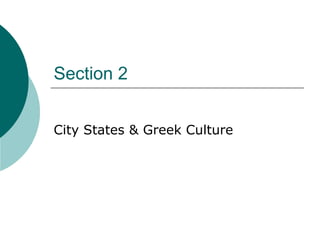
C:\Fakepath\Section 2
- 1. Section 2 City States & Greek Culture
- 2. 800 B.C. Greece began building settlements again Started with small villages, grew into towns, & towns joined with nearby villages to create a polis or city state
- 3. Rise of City-States Built walled fortresses or acropolis on top of hills for protection Acropolis became center for daily life Houses, temples, & open air markets and gathering places called agora were found outside acropolis Kings or tyrants (someone who took control of a government by force and rules alone) ruled city states at first Made all political decisions In time city states developed their own way of governing Aristocracy (wealthy ruling class) sometimes shared power with the king Comprised of landowners & merchants In other city states all free men rich or poor took part in gov’t Met in an assembly to make all decisions for the whole community Most city states had fewer than 5,000 people Overcrowding eventually caused people to find new places to live Colonies developed in Asia Minor, southern Europe, & northern Africa New colonies brought new natural resources & trade markets Greek ideas & customs also spread Rivalries grew between city states Began fighting over control of areas of Greece
- 4. Sparta Ancient civilization focused on physical activity Descendants of Dorian settlers Leaders believed through military strength they could control a city state ten times as large Sparta was filled with slaves 250,000 slaves & 25,000 citizens Formed a military culture to protect themselves against a slave revolt Children were put into training camps at age 7. Girls returned home after several years of training, but boys trained for war until 30 Men at 30 were allowed to become citizens, marry & have families Not free from army duty until 60
- 5. Army Camps Taught Spartans to obey leaders without question Never give up a battle, even when wounded Wore red uniforms to hide their wounds Was a disgrace to lose Greatest honor was to die defending their land
- 6. Women in Sparta Had fewer rights than men Ran their homes & handled business matters May have owned 2/5 of the land in Sparta
- 7. Way of Life Lived simple & sparse way of life By law everyone ate “in common, of the same bread & same meat” Trading was discouraged New ideas may bring unwanted change Citizens rarely allowed to travel outside their city state Depended on themselves & their resources Way of life changed little over time Sparta had two kings with little authority except in time of war Had assembly of citizens, but also very weak 5 wealthy landowners called ephors or small ruling group controlled the gov’t Made all decisions for Sparta Strict gov’t that was admired by many throughout Greece
- 8. Athens Main city state in southern uplands Young men were required to serve in the army only in time of war Gov’t encouraged people to take part in community decisions Grew into a system of democracy (rule by the people) Solon, Athenian leader, helped bring democracy to Athens around 594 B.C. People had more rights in gov’t under him 508 B.C. Cleisthenes allowed people to play even greater roles in gov’t 500 B.C. every free adult male over 20 was considered a citizen of Athens Citizens took part in city state’s assembly called Ecclesia Every member had 1 vote Decisions were made by majority rule Kept any one person from taking control of Athens
- 9. At special meetings a person could be exiled for 10 years if they received 6,000 ostraca or broken pieces of clay pots English word ostracism “act of shutting someone out” Athenian democracy did not include everyone Women could not take part in gov’t & did not count as citizens Did manage the family budget & household Slaves also did not have a part in democracy even though they made up 1/3 of population & did most of the work giving citizens the time to take part in democracy
- 10. To Be “Greek” During this time there was no sense of belonging to a single country People id with city state instead People did feel a culture connection or cultural identity with one another All Greeks called themselves Hellenes because they believed they had a common ancestor, the hero Hellen Ancient myth said that Hellen alone survived a flood long ago Also shared religion Cultural ID was seen in various activities Olympic Games brought city states together in peace Began about 776 B.C. Meet every 4 years to compete in athletic contests to honor the god Zeus (gods controlled daily events in the world) Common written language brought city states together Developed an alphabet based on the alphabet of the Phoenicians 1st letter was alpha, 2nd beta (English word alphabet comes from these Greek letters)